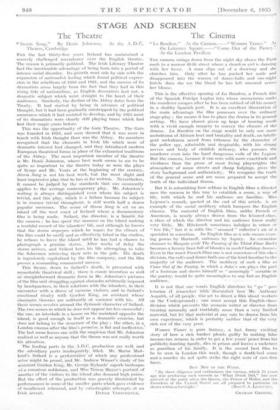The Cinema
"La Bandera." At the Curzon.—" Woman Tamer." At the. Leicester Square.—" Come Out of the Pantry." At the London Pavilion THE camera swings down from the night sky above the Paris roofs to a narrow ill-lit street where a drunken girl is dancing with her lover. A man slips out of a doorway and she clutches him. Only after he has pushed her aside and disappeared . into the warren of dance.thalls and one-night hotels does she see the blob(' he has left smeared across her blouse. '
This is the effective opening of La Bandera, a French film of the Spanish Foreign Legion into whose anonymotis ranks the murderer escapes after he has been robbed of all his money in a shabby Spanish port. It is an excellent illustration of the main advantage the film possesses over the ordinary stage-play ; the means it has to place the drama in its general setting. We have almost given ,up hope of hearing words with a vivid enough imagery to. convey the climate. of the drama. La Bandera on the stage; would be only one more melodrama of African heat and brutality and death, an intelli- gent melodrama saved from. triteness by the character of the police spy, admirable arid despicable, , with his strung nerves and body of childish delicacy, who pursues the • murderer even into the hard dangerous exile or the Legion. But the camera, because it can note with more exactitilde and vividness than the prose of most living playwrights the atmosphere of mean streets and cheap lodgings, gives the story background and authenticity. We recognise the truth of .the general . scene and are more prepared to accept the truth of the individual drama.
But it is astonishing how seldom in English films tvdirector uses the camera in this way to establish a scene, a way of life, with which he and his audience are familiar. Miss Lejeune's remark, quoted at the end of this article, is an example of the social snobbery which hampers the English cinema. The material of English films, unlike French or American, is nearly always drawn from the leisured, class, a class of which the director and his audience know really very little. Mr. Hitchcock sometimes indulges in 'crime. or " low life," but it is with the amused ". collector's air of a specialist in sensation. An English film as A rule means even- ing gowns by Hartnell, suitcases by Asprey. An . excursion steamer to Margate (vide The Passing of the Third Floor Thick) becomes a luXury liner full of blondes in model bathing-dresses. Even in the worst French films one is not.conseions of this class division, the cafes and dance-halls arnof thelind fan iliar•ta thc majority of. the audience. The .snobbery of such a film as COme Out of the Pantry, in which a duke's son plays the part of a footman and shows himself' so " amusingly " sociable in the pantry, Would be quite meaningless to any initLan English audience.
It is not that one wants English dime tors to " go " pro- letarian Or reinernher with discoinfort how kr. 'Anthony Asquith, of all people, w'a's set to direct a tilin about workers on the Underground) ; one Must accept this English-class- division which prevents the scenario writer .or director from treating naturally and truthfully more than a very 'limited material, but let 'that material at any rate' be drawn from his own experience ; is probablY neither that Of the '-ery rich nor Of the very pobr.
Woman Tamer is pure fantasy, a fast funny exciting story of how a rich banker pleads guilty :to making false income-tax returns in order to get a few years' Peace from his publicity-hunting family, dies in prison and leaves a racketeer as guardian of his . family.. It is the second .. best film to. be be seen in London this week, though n. deathTbed scene and a murder do not quite strike the right note of care-free farce. . .
BON MOT Or THE WEEK.
"By sheer diligence and enthusiasm the cinema, which 25 years ago was producing such morsels as "What Drink Did," has now arrived at the point when the Queen, the Prince of Wales, and the President of the United States arc all prepared to, patronise its shows within a fortnight.". (Miss C. A. LEJEU NE ).












































 Previous page
Previous page